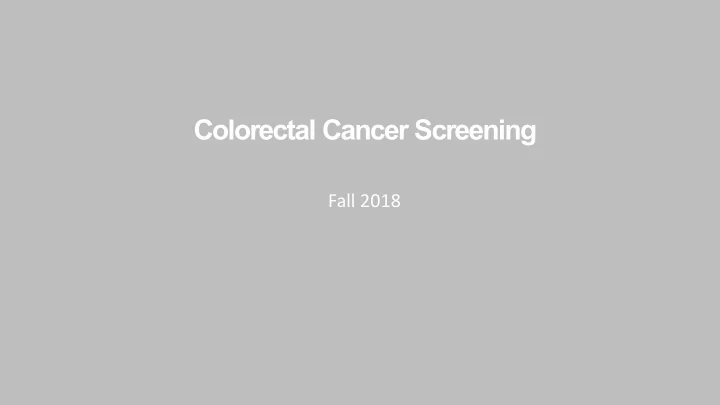

Colorectal Cancer Screening Fall 2018
Agenda • CRC Screening Landscape • Colonoscopy: The Gold Standard • Other Available CRC Screening Options • Q & A 2
When Should Screening Start? • CRC screening is generally recommended for all average-risk patients aged 50-75 • People with a family history of colorectal cancer or polyps are at increased risk and might need to start screening before age 50 • The American Cancer Society recently released its 2018 guideline which recommends that average- risk adults aged 45 years and older start screening • African Americans have the highest death rates from CRC when compared with all other racial groups in the United States The American College of Gastroenterology o (ACG) and the American Society for Gastrointestinal Endoscopy (ASGE) recommend CRC screening in African Americans to begin at age 45 3. Bénard F, Barkun AN, Martel M, von Renteln D. Systematic review of colorectal cancer screening guidelines for average-risk adults: Summarizing the current global recommendations. World Journal of Gastroenterology. 2018;24(1):124-138. http://dx.doi.org/10.3748/wjg.v24.i1.124. 4. Williams, R., White, P., Nieto, J., Vieira, D., Francois, F., & Hamilton, F. (2016). Colorectal Cancer in African Americans: An Update: Prepared by the Committee on Minority Affairs and Cultural Diversity, American College of Gastroenterology. Clinical and Translational 3 Gastroenterology, 7(7), e185. http://doi.org/10.1038/ctg.2016.36. 5. American Society for Gastrointestinal Endoscopy. Media backgrounder on Colorectal Cancer Screening. https://www.asge.org/home/about-asge/newsroom/media-backgrounders-detail/colorectal-cancer-screening. Accessed October 22, 2018. 6. American Cancer Society. American Cancer Society Updates Colorectal Cancer Screening. http://pressroom.cancer.org/releases?item=770. Accessed October 22, 2018.
Current CRC Screening Landscape • One in three Americans are not being screened • Providing choices increases screening compliance; but only to a point • Increasing attention in the news regarding colonoscopy vs. other tests References: 1. Fight Colorectal Cancer. About Colorectal Cancer. Facts and Stats. https://fightcolorectalcancer.org/prevent/about-colorectal-cancer/facts-stats. Accessed October 22, 2018. 4 2. American Cancer Society. Survival Rates for Colorectal Cancer, by Stage. https://www.cancer.org/cancer/colon-rectal-cancer/detection-diagnosis-staging/survival-rates.html. Accessed October 22, 2018.
Colonoscopy: The Gold Standard • Preventing cancer is always better than finding cancer • Colonoscopy is the only screening method that can both detect and remove pre-cancerous polyps • Colonoscopy is the only suitable test for people who have risk factors such as family history of CRC 5. American Society for Gastrointestinal Endoscopy. Media backgrounder on Colorectal Cancer Screening. https://www.asge.org/home/about-asge/newsroom/media-backgrounders-detail/colorectal-cancer-screening. Accessed October 22, 2018. 5 7 . Pan J, Xin L, Ma Y-F, Hu L-H, Li Z-S. Colonoscopy Reduces Colorectal Cancer Incidence and Mortality in Patients With Non-Malignant Findings: A Meta-Analysis. The American Journal of Gastroenterology. 2016;111(3):355-365. https://dx.doi.org/10.1038%2Fajg.2015.418.
MSTF Screening Recommendations • First-tier options are colonoscopy every 10 years or annual FIT • Second-tier options include CT colonography every 5 years, Cologuard every 3 years, or flexible sigmoidoscopy every 5 to 10 years • Third-tier tests include capsule endoscopy every 5 years due to limited evidence and barriers to access 6 8. Rex D, Boland C, Dominitz J et al. Colorectal Cancer Screening: Recommendations for Physicians and Patients from the U.S. Multi-Society Task Force on Colorectal Cancer. The American Journal of Gastroenterology 2017;112:1016-1030. http://doi.org/10.1038/ajg.2017.174.
NEJM Study on CRC Screening Options 7 9. Imperiale T, Ransohoff D, Itzkowitz S, et al. Multitarget Stool DNA Testing for Colorectal-Cancer Screening. New England Journal of Medicine, 2014;370:1287-1297. https://www.nejm.org/doi/full/10.1056/nejmoa1311194.
NEJM: Cologuard and FIT 8 9. Imperiale T, Ransohoff D, Itzkowitz S, et al. Multitarget Stool DNA Testing for Colorectal-Cancer Screening. New England Journal of Medicine, 2014;370:1287-1297. https://www.nejm.org/doi/full/10.1056/nejmoa1311194.
Insurance Considerations • Medicare will cover 100 percent of the initial CRC screening test chosen by a patient • If the initial test is positive, then subsequent testing may result in a large patient deductible and/or co-insurance bill because the second test would be considered a diagnostic or therapeutic service under Medicare billing codes 8. Rex D, Boland C, Dominitz J et al. Colorectal Cancer Screening: Recommendations for Physicians and Patients from the U.S. Multi-Society Task Force on Colorectal Cancer. The American Journal of Gastroenterology 2017;112:1016-1030. http://doi.org/10.1038/ajg.2017.174. 9 11. American Cancer Society. Colorectal Cancer: Early Detection, Diagnosis, and Staging: Insurance Coverage for Colorectal Cancer Screening. https://www.cancer.org/cancer/colon-rectal-cancer/detection-diagnosis-staging/screening-coverage-laws.html. Accessed October 22, 2018.
Review: Help Patients Choose the Best Option • Colonoscopy: The gold standard – the only suitable test for people with risk factors • MTSF: Offer patients Colonoscopy, then FIT, followed by Cologuard and CT Colonography • Insurance: Patients should understand screening benefit to avoid costly insurance co-payment 10 8. Rex D, Boland C, Dominitz J et al. Colorectal Cancer Screening: Recommendations for Physicians and Patients from the U.S. Multi-Society Task Force on Colorectal Cancer. The American Journal of Gastroenterology 2017;112:1016-1030. http://doi.org/10.1038/ajg.2017.174.
Recommend
More recommend